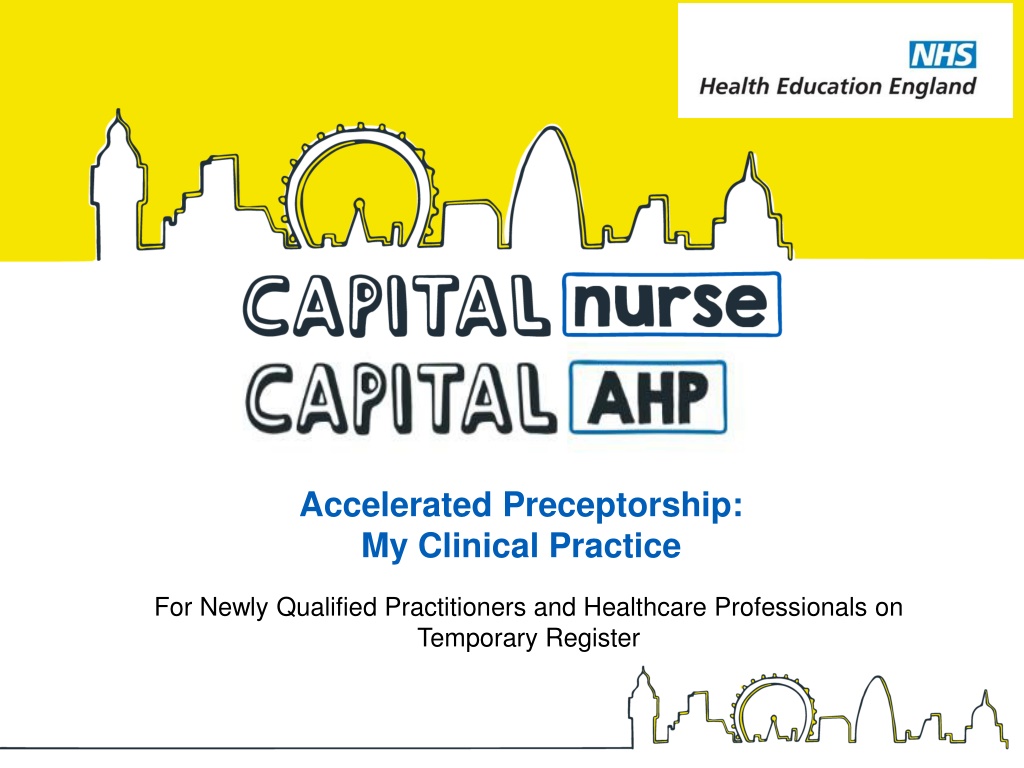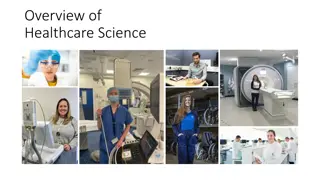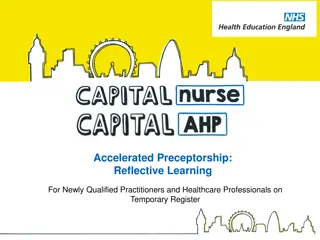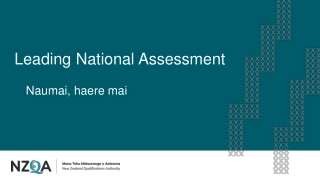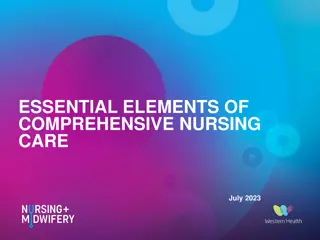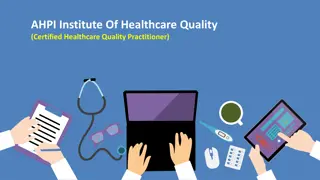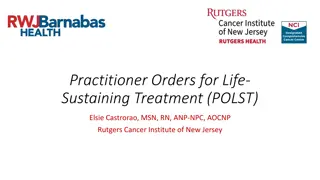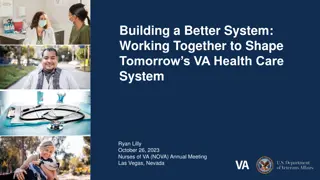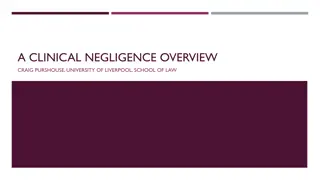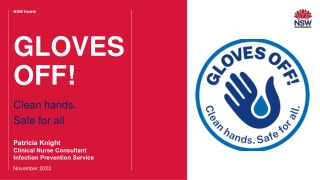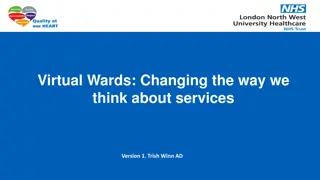Comprehensive Overview of Standards in Clinical Practice for Healthcare Professionals
This content covers essential topics such as professional standards, principles of care, communication, and regulatory frameworks for healthcare practitioners. It emphasizes the importance of understanding and adhering to standards set by regulatory bodies like the NMC, HCPC, and CQC. By exploring topics ranging from professional judgment to person-centered care, this resource aims to equip newly qualified practitioners with the knowledge and guidance necessary to deliver high-quality care and meet the fundamental standards expected in clinical practice.
Download Presentation
Please find below an Image/Link to download the presentation.
The content on the website is provided AS IS for your information and personal use only. It may not be sold, licensed, or shared on other websites without obtaining consent from the author. Download presentation by click this link. If you encounter any issues during the download, it is possible that the publisher has removed the file from their server.
Presentation Transcript
Accelerated Preceptorship: My Clinical Practice For Newly Qualified Practitioners and Healthcare Professionals on Temporary Register CapitalNurse is jointly sponsored by Health Education England, NHS England and NHS Improvement
Session Objectives By the end of this session you will: Understand your professional standards of practice Understand the fundamentals of care Know where to find your clinical skills and competency development frameworks Understand the principles of person-centred care Understand the principles of informed and effective practice Understand the principles of professional judgement and clinical decision-making Understand the principles of caseload management Understand the principles of communication in practice.
Standards of Practice The standards of practice for your profession is outlined by either the Nursing and Midwifery Council (NMC) or the Health and Care Professions Council (HCPC). It is important for you to review and understand your professional standards of practice: https://www.hcpc-uk.org/standards/ https://www.nmc.org.uk/standards/code/ Standards may include: Standards of proficiency Standards of conduct, performance and ethics Standards of continuing professional development Standards relevant to education and training
CQC Fundamental standards These are the minimum quality of care our patients can expect to receive. They are standards below which your care must never fall (CQC). Everybody has the right to the following standards: Care should be person-centred People should be treated with dignity and respect Consent should be ascertained before receiving care Treatment should be provided safely People should be safeguarded from abuse or improper treatment People should be given enough food and drink while receiving care / treatment.
CQC Fundamental standards Places where treatment is given (premises and equipment) should provide equipment that is clean, suitable and properly looked after People must be able to complain about their care / treatment Organisations must have good governance to meet these standards (e.g. plans / processes) Organisations must have enough suitably qualified, competent and experienced staff to meet standards of care Organisations must only employ people who can provide care and treatment appropriate to their role Duty of candour organisations must be open and transparent about people s care and treatment. Organisations must display their CQC rating in a place where people can see it.
CQC Fundamental Standards Exercise 1: Think about your organisation in relation to the fundamentals of care and your practice, how does it (or do you) meet these standards? Do you know how people can make complaints? Do you know what your organisation s CQC rating is? Do you know what your organisation s values are?
Clinical skills and competencies Clinical competencies may be related to your profession and / or to the clinical area in which you work. Each profession will have different core clinical skills and competencies depending on the level of practice: These are outlined by your professional body (see next slide) Your organisation will build relevant clinical competencies into your development program and tailor them to your role / level. It is important that you understand what your competencies are and how they should be documented Please ask your preceptor / supervisor.
Professional Bodies AHPs: Osteopaths: https://www.osteopathy.org.uk/home/ Art Therapists: https://www.baat.org/ Paramedics: https://collegeofparamedics.co.uk/COP/ Drama therapists: https://badth.org.uk/ Physiotherapists: https://www.csp.org.uk/ Music therapists: https://www.bamt.org/ Prosthetists and Orthotists: Chiropodists/podiatrists: https://cop.org.uk/# Radiographers: https://www.sor.org/ Dietitians: https://www.bda.uk.com/ Speech and language therapists: https://www.rcslt.org/ Occupational therapists: https://www.rcot.co.uk/ Operating Department Practitioners: https://www.unison.org.uk/at-work/health- care/representing-you/unison-partnerships/codp/ Nursing and Midwifery NMC: https://www.nmc.org.uk/ Orthoptists:https://www.orthoptics.org.uk
Multi-professional clinical practice In addition to profession and role specific competencies and skills, there are core principles that underpin multi-professional clinical practice: Delivering person-centred care Effective and informed practice Professional Judgement and clinical decision-making Caseload management Communication.
Person-centred care Treat people as individuals and uphold their dignity: Treat people with kindness, respect and compassion Deliver the fundamentals of care effectively Avoid making assumptions Recognise diversity and individual choice Respect and uphold people s human rights. Listen to people and respond to their preferences / concerns: Work in partnership with people to deliver care effectively Recognise and respect the people make to their own health and wellbeing Encourage and empower people to contribute to decisions about their treatment and care Respect the level to which people want to be involved in decisions Recognise when people are anxious or in distress and respond compassionately.
Person-centred care Act in the best interests of people at all times: Balance the need to act in best interests of people at all times with need to respect person s right to accept or refuse treatment Adhere to all relevant laws about mental capacity Make sure that the rights and best interests of those who lack capacity are still at the centre of the decision-making process. Respect people s right to privacy and confidentiality Respect a person s right to privacy and confidentiality (even after they have died) Share with people and their families, as the law allows, information they want or need to know about their health, care and treatment.
Person-centred care Exercise 2: Think about your role and describe how you demonstrate the following in your practice: 1. Treat people as individuals and uphold their dignity 2. Listen to people and respond to their preferences / concerns 3. Act in the best interests of people 4. Respect people s right to privacy and confidentiality.
Informed and Effective Practice Always clinically practise in line with the best available evidence Maintain your knowledge and skills to deliver safe and effective clinical practise Make sure any information or advice given to people is evidence based. Work co-operatively in a clinical setting Respect the clinical skills, expertise and contributions of your colleagues by raising matters to them when appropriate or seeking advice and knowledge Maintain effective communication with colleagues regarding people s care Work with your supervisor, preceptor and other colleagues to evaluate the quality of your clinical work Share information to identify and reduce risk with colleagues.
Informed and Effective Practice Share your clinical skills, knowledge and experience for the benefit of people receiving care and your colleagues Provide accurate and constructive feedback to colleagues about people s care Gather and reflect on feedback from a variety of sources, using it to improve your clinical practice and performance Deal with differences of opinion with colleagues by discussion and informed debate, respecting their views and opinions and behaving in a professional way at all times.
Informed and Effective Practice Keep clear and accurate clinical records relevant to your practice Complete clinical records at the time or as soon as possible after an event, recording if the notes are written some time after the event Identify any risks or problems that have arisen and the steps taken to deal with them, so that colleagues who use the records have all the information they need Complete records accurately and without any falsification, taking immediate and appropriate action if you become aware that someone has not kept to these requirements Attribute any entries you make in any paper or electronic records to yourself, making sure they are clearly written dated and timed, and do not include unnecessary abbreviations, jargon or speculation Take all steps to make sure that clinical records are kept securely.
Informed and Effective Practice Demonstrate an awareness of the importance of record keeping and participate in the auditing of clinical records Make sure that you get properly informed consent to treat and document it before carrying out any action.
Informed and Effective Practice Exercise 3: Think about your role and describe how you demonstrate the following in your practice: 1. Practise in line with the best available evidence 2. Work co-operatively 3. Share your skills, knowledge and experience for the benefit of people receiving care and your colleagues 4. Keep clear and accurate records relevant to your practise.
Professional Judgement and Clinical Decision Making Clinical decision making is a balance of experience, awareness, knowledge, information gathering, using appropriate assessment tools, colleagues and evidence based practice.
Professional Judgement and Clinical Decision Making Factors that influence decision making In busy clinical settings, what you now about the patient, the situation, environment, evidence and research will help you to make an informed decision. Understand the evidence Refer to journals, books, and other published resources Aim to build up specialist knowledge in your clinical setting Start to develop a knowledge base of your cases and outcomes Understand best practice approaches in your clinical setting. Know yourself Be clear on your skills e.g. competencies, knowledge, experience, how your respond, your behaviours, attitudes, and values Be clear on you limitations know when to seek help, advice and support from others.
Professional Judgement and Clinical Decision Making Understand your patient What are their preferences? Understand their need and their clinical journey so far What is normal for them? What matters to them? Know the clinical environment Who can you lean on for support? Who can you engage to help you make your decisions? Understand the wider team dynamics Know the values of your organisation.
Professional Judgement and Clinical Decision Making Assess risk and act on findings to ensure patient safety Assess situations and contribute to the identification of the root cause of a problem Develop effective relationships to gather information and deliver care in partnership with patients, clients and carers Share information effectively and concisely for a range of situations and contexts to ensure patient safety and continuity of care. Make judgements requiring analysis interpretation and comparison of options Develop and implement reflective skills and evidence changes to practice to improve outcomes for clients, service, profession or organisation Use critical thinking, analysis and evaluation in making clinical judgements Draw on a range of sources in making judgements guided as necessary by senior colleagues regarding management and delegation to others Have a comprehensive range of cognitive and practical skills required to develop creative solutions to abstract problems.
Professional Judgement and Clinical Decision Making Make sure that people s physical, social and psychological needs are assessed and responded to Promote wellbeing, prevent ill-health and meet the changing health and care needs of people during all life stages Recognise and respond compassionately to people s needs Act in partnership with those receiving care, helping them to access relevant health and social care, information and support when they need it Act as an advocate for the vulnerable, challenging poor practice and discriminatory attitudes and behaviour relating to their care Actively listen and seek the views of others to facilitate shared ownership of decision making Demonstrate an awareness of risk management issues and be able to take appropriate actions and complete documentation as necessary.
Professional Judgement and Clinical Decision Making Exercise 4: Think about your role and describe how you demonstrate the following in your practice: 1. Assess risk and act on findings to ensure patient safety 2. Make judgements requiring analysis interpretation and comparison of options 3. Make sure that people s physical, social and psychological needs are assessed and responded to.
Caseload Management Caseload management is a process of organising the care of your patients based on need. Caseload management is an important skill to develop. Key skills for caseload management include: Organisation Priority setting Coordination
Caseload Management Caseload analysis Caseload analysis involves understanding: The number of patients / clients on your current caseload The complexity of their needs The number of new referrals received and their needs This will help you to prioritise and organise your work plan. Prioritisation of cases Prioritising need will be based on up to date clinical assessment / health status, including: Clinical background Current health status Current physiological ability Current cognitive ability Social Care needs
Caseload Management Care planning Care planning is essentially about a person s full range of needs, taking into account: Health Personal Social Economic Educational Mental health Ethnic and cultural background Personal circumstances It recognises that there are other issues in addition to medical needs that can affect a person s total health and well-being. Whilst a person may have less complex medical needs if they have more care planning needs, this may influence caseload priorities.
Caseload Management Time Management To prioritise your clinical work you will need good time management skills. These include: Skills in goal setting Able to set priorities Planning and organising skills Minimizing time wasting Tips for managing your time: Plan your day out in advance where possible This will help you to organise your day Use lists and tick off tasks as you complete them Focus on the most important activities first Caseload / Patient need Risk Potential impact Deadlines / timeframes
Caseload Management Stay focused there will be lots of distractions in your day Some distractions will be important Others will not Choose carefully which ones need you attention now and which ones do not Keep yourself and workspace well organised Try and keep calm Clear heads and workspaces will help Learn to delegate Delegating tasks out will help you to manage your tasks. If delegating tasks to other, remember to: Give the right instructions Give to others with the right skills for the task Ensure they have the right tools Give a clear timeframe You are still accountable Clarity of knowledge, competency in skills and confidence in your practice are also essential to effective time management.
Communication It is important to communicate clearly with the people you are caring for or treating Use terms that people in your care can understand Take reasonable steps to meet people s language and communication needs, providing, wherever possible, assistance to those who need help to communicate their own or other people s needs Use a range of verbal and non-verbal communication methods, and consider cultural sensitivities, to better understand and respond to people s personal and health needs Check people s understanding from time to time to keep misunderstanding or mistakes to a minimum Be able to communicate clearly and effectively in English.
Communication Exercise 4: Think about your role and describe: 1. Verbal communication 2. Non-verbal communication How do you use these communication methods in your practice?
Additional Resources: In addition to this information, there are a range of resources to supplement your learning: Allied Health Professions Network: https://www.ahpnw.nhs.uk/covid-19-ahps https://www.ahpnw.nhs.uk/images/Covid_19__AHP_students_ 240420.pdf CapitalNurse Resources: https://www.hee.nhs.uk/capitalnurse/ HEE https://www.hee.nhs.uk/coronavirus-covid-19 Royal College of Nursing https://www.rcn.org.uk/
References Care Quality Commission. The Fundamental Standards. Accessed on 05.05.2020. <https://www.cqc.org.uk/what-we-do/how-we-do-our-job/fundamental-standards> Ervin, N.E. (2008). Caseload Management Skills for Improved Efficiency. The Journal of Continuing Education in Nursing 39(3):127-32 Nayak, S.G. (2018). Time Management in Nursing Hour of Need. International Journal of Care Sciences 11 (3): 1997 2000. Nursing Midwifery Council. The Code: Professional standards of Practice and behaviour for nurses, midwives and nursing associates. Accessed on 05.05.2020 https://www.nmc.org.uk/globalassets/sitedocuments/nmc-publications/nmc-code.pdf Royal College of Occupational Therapists. The Carer Development Framework: Guiding Principles for Occupational Therapy. Accessedon 05.05.2020 <https://www.rcot.co.uk/sites/default/files/CAREER_FRAMEWORK.pdf> Welsh Government. (2020). Modernising Allied Health Professions Career in Wales: A post registration framework. Accessed on 05.05.2020 <https://gov.wales/sites/default/files/publications/2020- 02/modernising-allied-health-professions-careers-in-wales.pdf>
Acknowledgments Jules Marchant, Therapy Practice Development Lead, Guy s and St Thomas NHS Trust, and Health Education England RePAIR Fellow Catherine DesForges, Head of Education and Development for AHPs, Royal Free London NHS Trust Desiree Cox, Preceptorship Project Manager, CapitalNurse
